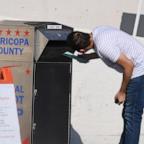Candidates' Senate votes fall by wayside on campaign trail
WASHINGTON -- Barack Obama's vote Wednesday for a controversial warrantless surveillance bill marked a rare event: the 12th day this year that the Illinois Democrat turned up for a roll call vote in the Senate.
His Republican presidential rival, Arizona Sen. John McCain, has an even worse attendance record: six days. McCain, who skipped votes Wednesday on Medicare and surveillance so he could campaign in Pennsylvania and Ohio, last cast a Senate vote on April 8.
The first election to feature two sitting senators is providing a stark barometer of just how long and distracting presidential campaigns have become. The Senate's roll call votes help illustrate how much time this year's presidential hopefuls have spent on the campaign trail.
McCain has cast 36 of the Senate's 169 votes this year, according to a USA TODAY analysis. Obama: 70 votes.
Their truancy began in 2007, long before the primaries and caucuses. McCain's voting participation score, as tabulated by non-partisan Congressional Quarterly, dropped from 91% in 2006 to 44% last year. Obama fell from 99% in 2006 to 66% last year.
McCain spokesman Tucker Bounds said McCain "has not missed a vote where his vote would have determined the outcome of legislation."
Obama spokesman Nick Shapiro said Obama regularly consults with his Senate staff, and has returned to vote on "legislation of significant national importance."
Some experts argue that Obama and McCain, who earn $169,300 a year plus pension benefits, aren't out of line by Washington standards.
In 2004, then-Democratic presidential nominee John Kerry, a Massachusetts senator, showed up for only 10% of the votes he was supposed to cast. Given the slow and unpredictable pace of business in the Senate, a candidate "could lose a whole day on the campaign trail waiting for a bill to come up," notes Ray Smock, director of the Robert C. Byrd Center for Legislative Studies at West Virginia's Shepherd University.
Because senators cast votes, it's easy to determine whether they're at work. For other politicians, however, it's easier for them to campaign on taxpayers' time without being noticed, says Thomas Mann, a congressional scholar at the Brookings Institution.




